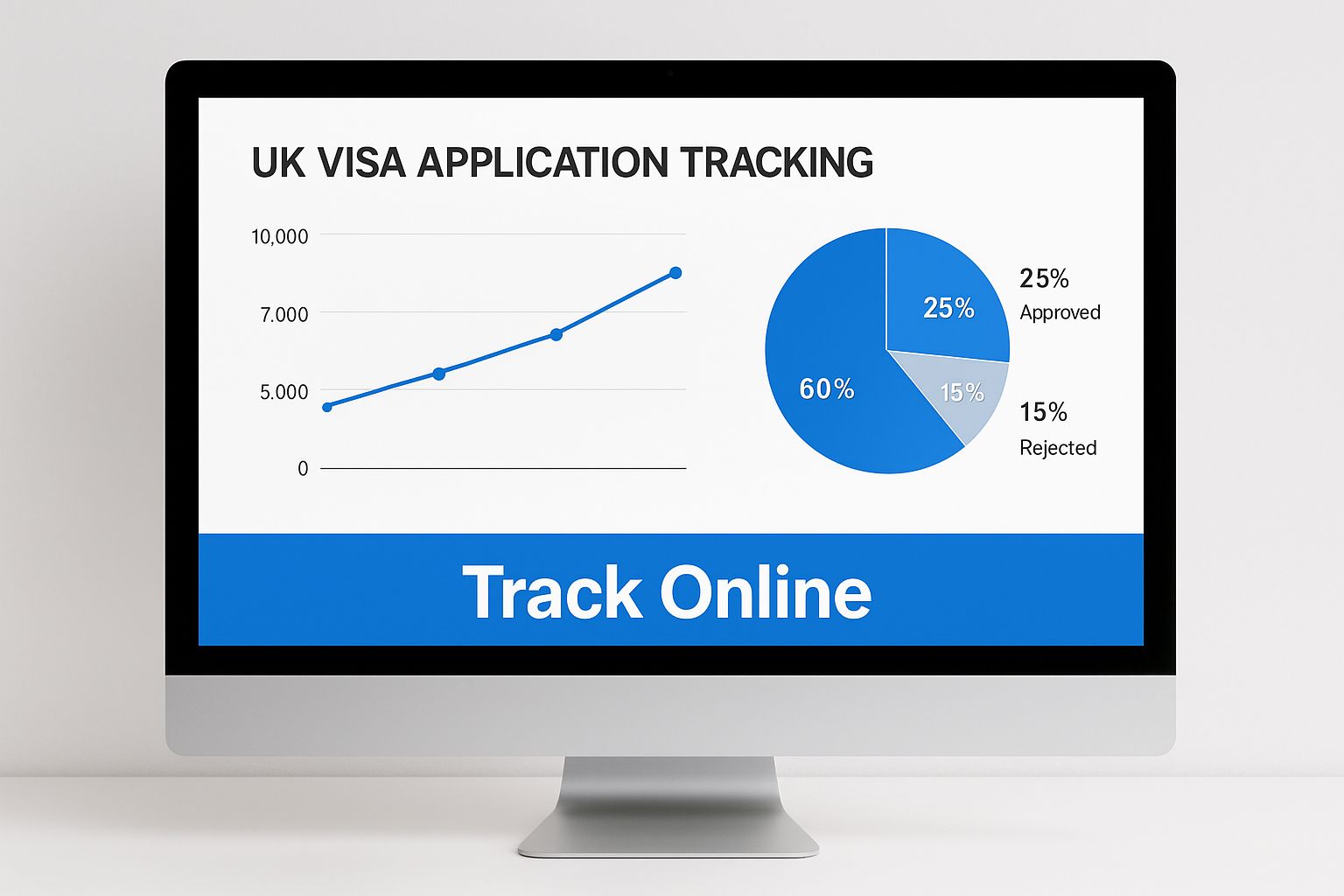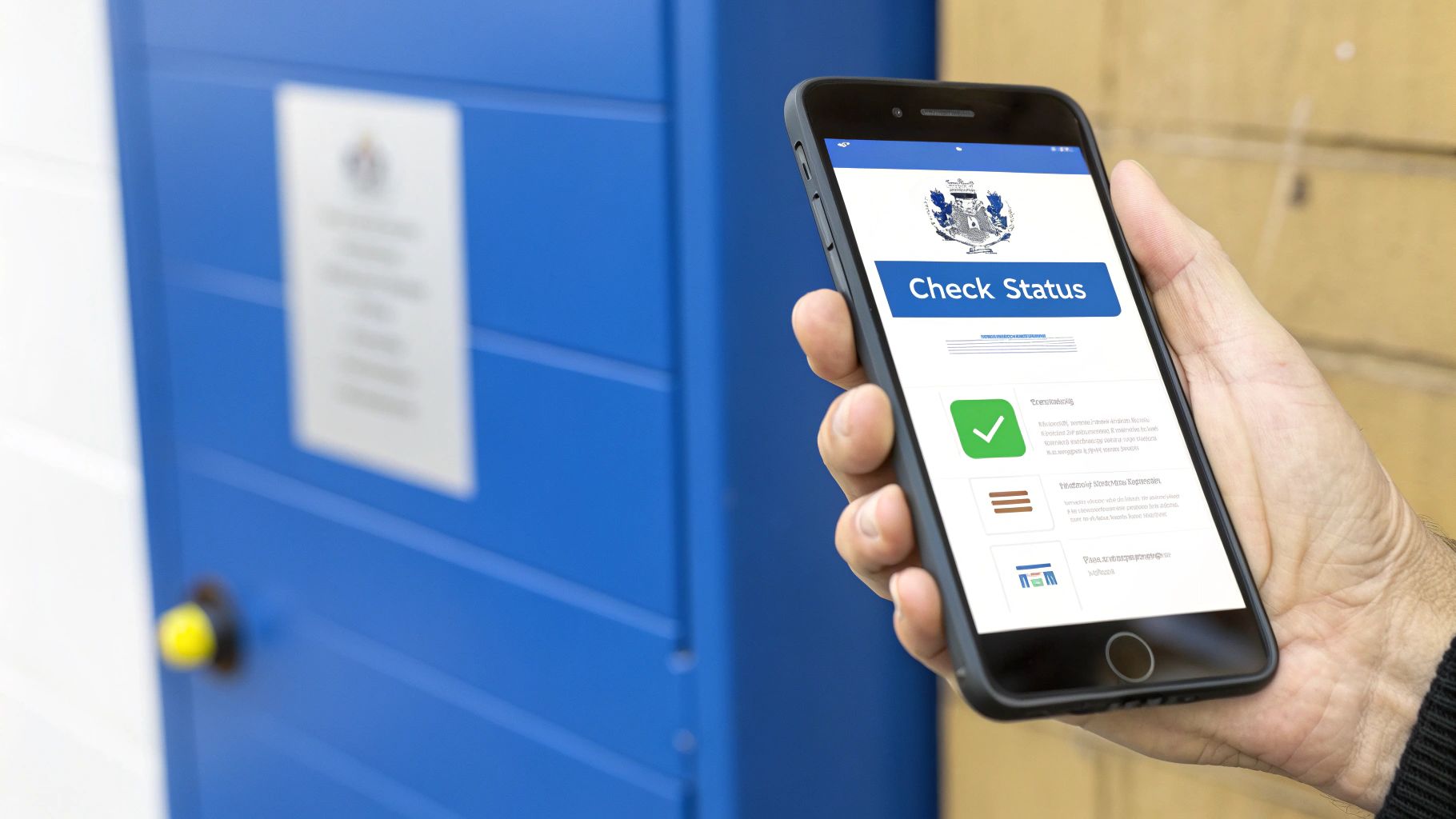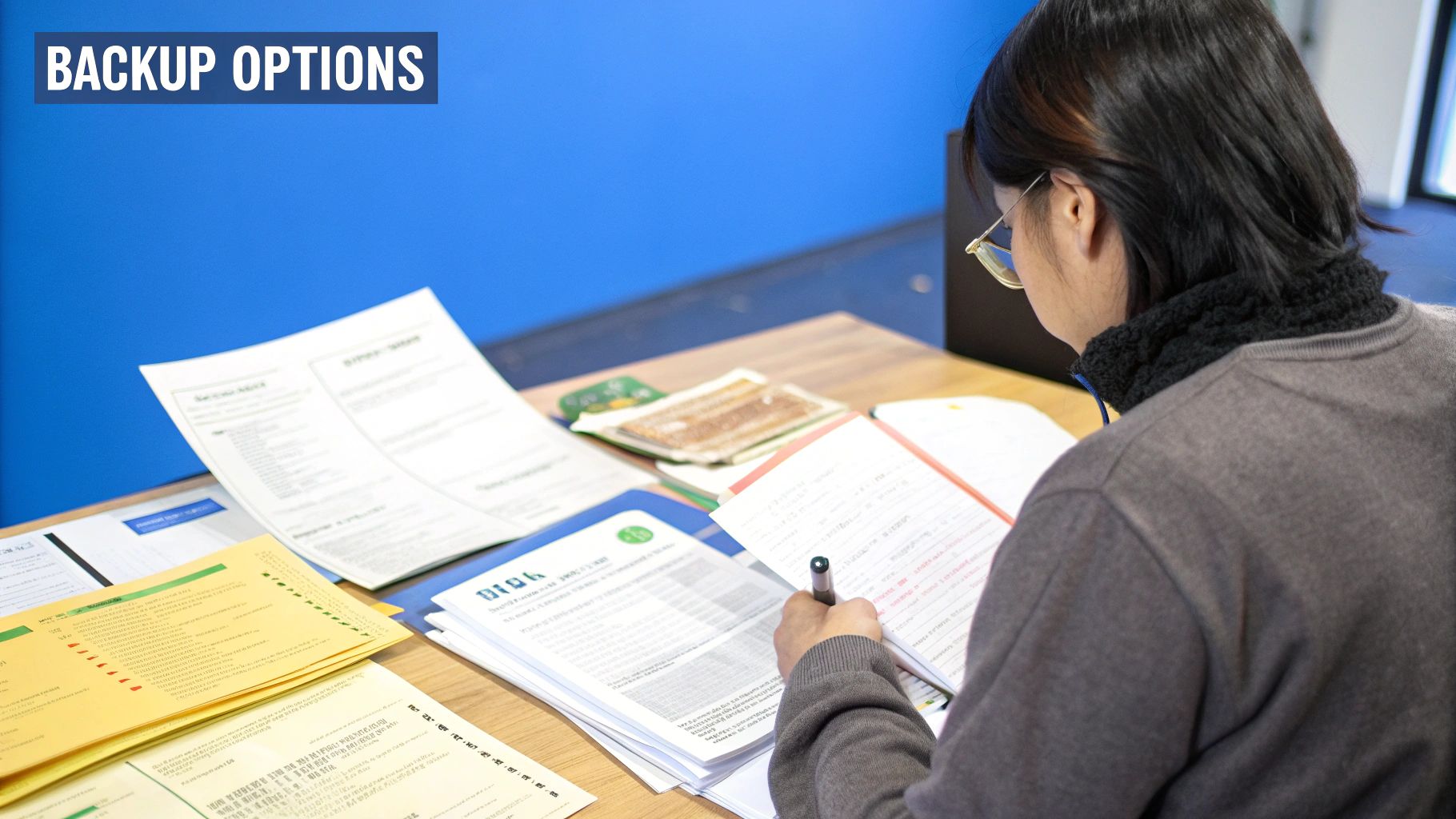Tracking UK Visa Application: Tips & Insider Guidance

What You Really Need Before You Start Tracking
Tracking your UK visa application can feel a bit like trying to find a needle in a haystack, right? So many portals, so many updates (or lack thereof!), it's easy to feel lost. But before you even think about diving into those online systems, take a deep breath and gather some crucial info. Trust me, this advice comes from countless chats with fellow Nigerians navigating the same visa journey.
Your GWF reference number is your best friend in this process. Seriously, treat it like gold. Store it securely, maybe in a few different places, and definitely take a screenshot and email it to yourself. This number is the key that unlocks every system related to your application.
Also, round up all your supporting documents and make sure you have digital copies easily accessible. This will save you a ton of time and stress later on. I can't tell you how many times I've heard stories of people scrambling to find a document at the last minute.
This screenshot from the UK government website shows exactly what you'll need: your reference number, date of birth, and passport number. It looks simple enough, but having all this ready to go beforehand makes a world of difference. I have a friend who spent hours hunting down her passport number while trying to track her application. She was a wreck! Learn from her mistakes – be prepared.
Another important thing to remember is the type of visa you're applying for. This significantly impacts the tracking process. A student visa application, for instance, will have a different timeline and procedure compared to a work visa application. Knowing these nuances upfront helps manage expectations and avoids unnecessary surprises.
Finally, do some research on typical processing times for your specific visa category. Knowing realistic wait times can save you a lot of anxiety. You'll have a better sense of whether a delay is normal or if you need to follow up. Having all this information at your fingertips will transform your tracking experience from a stressful ordeal into a much smoother process.
Mastering The VFS Global Portal Like A Pro
The VFS Global portal is your main hub for tracking your UK visa application. It can feel a bit like navigating Lagos traffic at times, but trust me, once you get the hang of it, it's not so bad.

See that big "Track Online" button? That's your key. This dashboard is basically your digital window into what's happening with your application.
Once you’re logged in, you'll see different status updates. These messages can be a little cryptic, so let me give you the inside scoop.
Decoding The Status Updates
"Application Received," for example, just means VFS has your paperwork. Don't pop the champagne just yet – it doesn’t mean your visa is approved, just that the process has begun. Then there's "Processing." This means your application is under review. This stage can take a few days, or even several weeks depending on the visa type. I remember waiting for my spouse visa and it felt like forever. Don't stress if it feels slow – a thorough review is much better than a rushed one.
To help you navigate the jargon, I've put together this handy table:
VFS Portal Status Updates Decoded: Real meanings behind confusing status messages with practical timelines.
| Portal Message | What's Actually Happening | Expected Wait Time | Your Next Move |
|---|---|---|---|
| Application Received | VFS has your application | 1-3 business days | Sit tight, you'll hear back soon. |
| Processing | Your application is under review | Varies depending on visa type (could be weeks) | Check the portal periodically for updates. |
| Decision Made | A decision has been reached. This doesn't automatically mean approval! | 1-2 business days for notification | Prepare to collect your documents/passport |
| Passport Dispatched | Your passport is on its way back to you | Depends on the courier service | Track the courier using the provided tracking number. |
This table breaks down the common messages and gives you a realistic idea of what to expect. Knowing these timelines can save you a lot of anxiety!

The VFS Global website itself is pretty user-friendly, but sometimes things go wrong. Knowing what to look for is key.
Troubleshooting Tips
If you hit a snag, call the VFS helpline. Having your GWF number handy will really speed things up. Also, make a note of any error messages you see – this helps the VFS team troubleshoot more effectively.
Applying for a visa can be stressful, but knowing how to use the VFS portal can make it much less daunting. Remember, patience and persistence are your friends! And if you need more info on UK visa requirements for Nigerians, check out this helpful guide.
Why Your Visa Type Changes Everything About Timing

Let's talk timelines. Your UK visa type really does drive the whole application process. It's the key factor in how quickly (or slowly) things progress. A tourist visa, because it's usually simpler, tends to move through the system much faster than a work visa, which can sometimes feel like trying to get across Lagos during rush hour.
Why the difference? Work visas naturally involve more in-depth checks and various levels of approval, which adds to the processing time.
Think of it this way: applying for a tourist visa is like hopping on a danfo – quick and straightforward. A work visa application is more like squeezing onto a molue – plenty of stops and a good chance of delays along the way. Neither is inherently better, they're just different journeys with different expected timelines.
Understanding Visa Processing Timelines
A Standard Visitor visa might typically take a few weeks to process, whereas a Skilled Worker visa could take several months. And don't forget the seasonal peaks! Certain visa categories have predictable surges in applications. For example, student visa applications tend to pile up just before the academic year begins, which can lead to longer processing times. It’s like everyone trying to get on the same bus at once. If you’re interested in recent UK immigration updates, check out this article about UK immigration new rules.
To give you a clearer picture, let’s look at some recent application data. Between April 2024 and January 2025, there were 23,200 applications from main applicants for Health and Care visas. Interestingly, this is actually a decrease compared to previous years, reflecting some of the broader shifts in work visa demand. You can find more detailed statistics here.
To help you manage your expectations, I've put together a table summarizing typical processing times and potential delays based on visa category.
Visa Processing Reality Check By Category
Honest timelines based on recent application data and real experiences
| Application Type | Typical Processing | Priority Options | Seasonal Delays |
|---|---|---|---|
| Standard Visitor Visa | A few weeks (typically 6-8 weeks) | Available (reduces processing time, but at a higher cost) | Summer months (July-September) |
| Skilled Worker Visa | Several months (can range from 3-6 months or longer depending on individual circumstances) | Available | Less pronounced, but can experience delays during peak recruitment seasons |
| Student Visa | Varies depending on the country of origin and the specific institution. Generally, several weeks (6-8 weeks is typical, but allow for longer) | Available in some cases | August-September (before the start of academic year) |
| Health and Care Visa | Currently experiencing decreased demand, but still expect several weeks to months (3-6 months) | Available | Less pronounced than other categories |
As you can see, processing times can vary quite a bit. While general timelines offer a useful starting point, it's essential to remember that each visa category has its own unique rhythm. Knowing this helps you gauge if your application is progressing as expected or if you might need to follow up.
Family Visa Tracking In The New Reality
Family visa applications (spouse, dependent, family reunion) are a bit of a headache to track these days. Recent policy changes have made the whole process unpredictable, impacting timelines and approvals. Think of it like navigating a Lagos roundabout at rush hour – chaotic and stressful!
One moment processing times look manageable, the next they're stretched out indefinitely. This uncertainty adds to the already emotional journey. And it's not just waiting times; the whole application process is evolving.
The number of Family visa applications in the UK has seen some wild swings due to policy changes. For example, after stricter family income requirements were announced in December 2023, applications jumped to 12,700 in April 2024. But when the rules actually kicked in, applications dropped to 6,900 in May 2024. These fluctuations show how policy changes directly affect families hoping to reunite in the UK. You can get more details on these shifts here.
So, how do you keep your sanity during this process? Understanding the specific document requirements and what they mean is key. A request for more documents isn't necessarily a red flag, but it does mean a longer wait. Even a small change in your status update on the tracking portal can give you valuable insight into your application’s progress.
Connecting with others who have gone through this process is invaluable. Hearing their stories, the good and the bad, can help manage the emotional ups and downs and prepare you for different outcomes. This shared experience creates a sense of community during what can be a quite isolating time.
Beyond The Standard Portal: Alternative Tracking Methods
So, you’ve been glued to the VFS Global portal, anxiously refreshing the page, but your UK visa application status is giving you the silent treatment? Trust me, I've been there. Anyone who's applied for a UK visa knows that sometimes the standard portal just doesn't cut it. Luckily, there are other ways to get a handle on things and breathe a little easier.

This screenshot shows the UKVI contact page, highlighting the different ways you can reach out about your visa application. The portal is usually your go-to, but sometimes picking up the phone or sending an email can be a game-changer. The important thing is knowing what options you have and when to use them.
One thing you can do is contact the visa application center directly. This is especially useful if you have a burning question or if your application is actually delayed (we’ve all convinced ourselves of the worst at some point, right?). Keep your GWF number handy – it’s like your visa application’s VIP pass and will save you loads of time. Also, some visa application centers will send you email updates. These can be more detailed than the basic portal notifications, giving you a better picture of where your application is in the process.
Depending on your visa type and the application center, you might also have SMS tracking available. It’s not as common, but it's another way to get quick updates without constantly logging into the portal. And don’t forget about third-party tools! There are some handy apps out there that pull together updates from different places, like the official portals and courier services, making it much easier to keep everything organized.
Finally, knowing when to escalate things is a real skill. If you think there’s a genuine delay, understanding the right channels to use – whether it's email, phone, or webchat – can make all the difference in getting a quick resolution. The bottom line is, tracking your UK visa application effectively means using all the tools at your disposal.
Solving The Most Frustrating Tracking Problems
Let's be real, tracking a UK visa application from Nigeria can feel like navigating a Lagos go-slow – frustrating and confusing. But you're not alone! Many applicants face similar tracking headaches, and thankfully, there are solutions. Let's tackle the most common ones together.
Have you ever experienced that sinking feeling when your reference number suddenly stops working? Or maybe your application status seems stuck in a time warp? These issues are frustrating, but often fixable. The first thing to do is figure out if you're dealing with a normal processing delay or a genuine technical glitch.
For instance, if your status stays on "processing" for a few weeks, don't panic. This is often perfectly normal, particularly for complex visa types like work permits. I remember waiting anxiously for my spouse visa, and the "processing" stage felt like an eternity! This guide on visa application tracking might ease your mind.
On the other hand, a reference number that completely disappears from the system is a definite red flag. This usually signals a technical issue that needs your immediate attention. I once knew someone whose reference number vanished into thin air. Turned out to be a simple system error, and a quick call to the visa application centre fixed it right up.
Distinguishing Between Normal Delays and Real Problems
Sometimes, the tracking systems themselves have their off days. Websites crash, databases get overloaded – these things happen. Take a deep breath, don't panic! These glitches are usually temporary. Try checking the portal again later or try using a different browser. Sometimes, that's all it takes.
But what if the problem sticks around? Document everything! Seriously, screenshots of error messages, dates and times of support calls, any reference numbers or case IDs – keep a record of it all. This detailed record is your best friend when you're trying to get your issue resolved.
Speaking of visa trends, did you know that UK Seasonal Worker visa applications have fluctuated in recent years? In the year ending March 2025, there were 35,800 such applications, a 1% decrease from the year before. It's always interesting to see how these trends change. You can find more insights here.
Getting Help When You Need It
If the official channels seem to have gone quiet, remember there are other avenues for information. Online forums and social media groups can be surprisingly helpful. Connecting with other applicants going through similar experiences builds a sense of community and often uncovers valuable tips and solutions you won’t find anywhere else.
Remember, you're not in this alone. Knowing how to troubleshoot these common tracking problems puts you back in the driver's seat. It empowers you to navigate the sometimes-complex world of UK visa tracking with more confidence.
Your Practical Tracking Game Plan That Actually Works
So, you've submitted your UK visa application and now the waiting game begins. I know it’s tempting to constantly check for updates, but trust me, there’s a better way to handle this without losing your mind. Let's ditch the obsessive refreshing and create a tracking plan that actually works.
Finding Your Tracking Rhythm
How often should you peek at the portal? Once a day, maybe twice max. Seriously, any more than that and you're just adding unnecessary stress. Remember, these systems aren't always real-time. Updates can take time, and staring at the screen won't speed things up. It’s like waiting for your jollof rice to cook – checking every minute won't make it ready any faster!
Set up a reminder system that fits your life. A specific time each day, a calendar alert – whatever works for you. I personally use my phone’s reminder app, and it's a game-changer. It keeps me informed without letting the tracking process take over my entire day.
Staying Organized and Informed
Create a dedicated folder – digital or physical – for all your visa documents and communication. Your GWF number, passport details, application confirmation, emails from the visa application center – everything goes in there. Believe me, this organizational system will be your best friend during this waiting period. It's like having a single source of truth for all things visa-related.
Managing Expectations and Emotions
Let's be real, visa waiting times can be an emotional rollercoaster. Prepare yourself for potential delays, but also be hopeful for good news. Having a Plan B in your back pocket can ease some anxiety, too. And don’t underestimate the power of talking to others who've been through this process. Their experience and support can be incredibly helpful in navigating the emotional ups and downs.
Building a support network is key. Chat with friends, family, or join online communities with other applicants. Sharing your experiences can make a huge difference. Think of it as having a travel buddy on a long, sometimes unpredictable journey.
From Stress to Success: Practical Tools and Checklists
Turn tracking from a source of stress into a smooth, manageable process with these simple tools:
- Tracking Spreadsheet: A simple spreadsheet to log key dates, status updates, and communication.
- Reminder App: Set reminders to check your application status and important deadlines.
- Support Network: Connect with others going through the same thing for encouragement and advice.
Think of these tools as your personal visa application assistants. They help you stay organized and on track without letting the process consume you.
Ready to take control of your relocation journey? JapaChat, Nigeria’s AI immigration expert platform, is here to empower you every step of the way. Sign up for free and start planning your future with confidence.

Leave a Reply